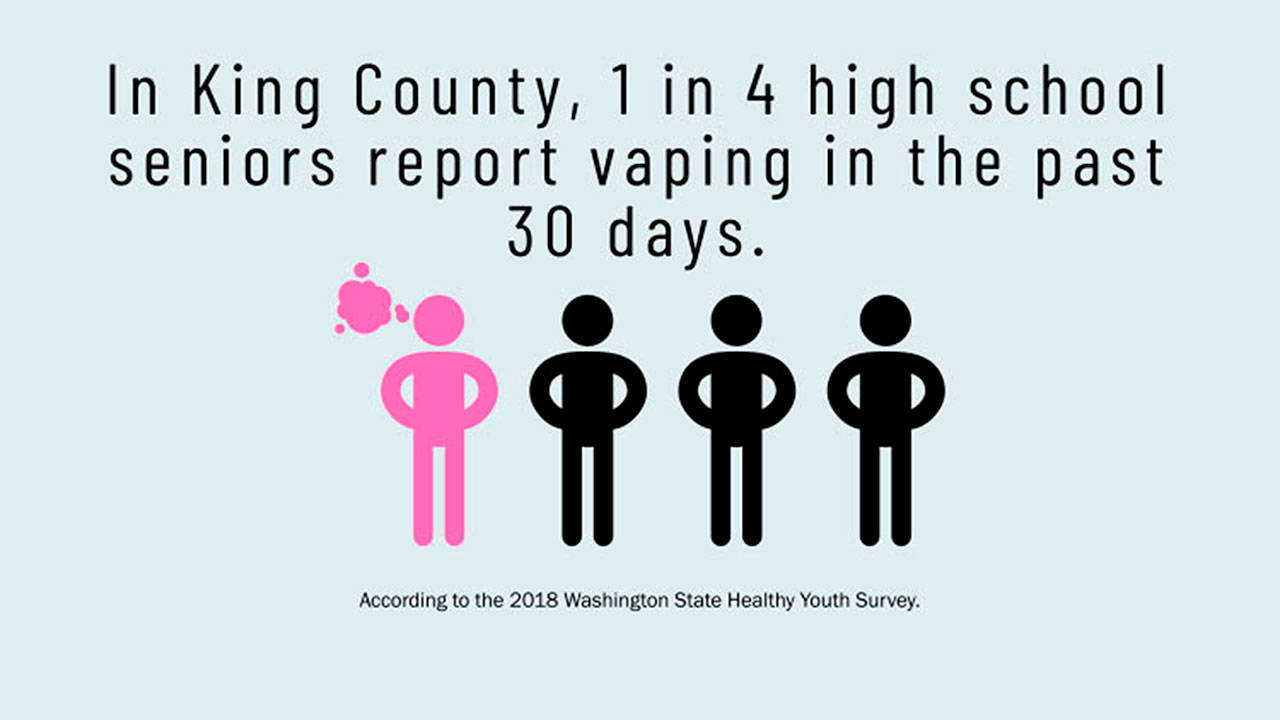The following is a press release written by the King County Health Department’s Public Health Insider:
Over the past several years, electronic cigarette use has grown in popularity as an alternative to smoking combustible cigarettes. While this switch does protect individuals from the dangers of combustion, vaping and e-cigarette use has other risks – including nicotine dependency and lung injury.
But this isn’t the whole picture. Beyond being highly addictive, nicotine’s health impacts have been largely overshadowed by the consequences of the other toxins in combustible cigarettes. Considering the increasing number of youth using e-cigarettes, it is especially important to understand how nicotine impacts health.
So, what do we know about nicotine? The following is a summary of the years of research that have helped us answer this question.
What we know about nicotine:
1. Nicotine’s potential for addiction is comparable to heroin and cocaine. 10 seconds after entering the body, nicotine reaches the brain and releases dopamine, which is a hormone responsible for feelings of pleasure. When nicotine levels drop, withdrawal kicks in and makes it hard for someone to concentrate on anything other than the next hit.
The contents of e-cigarettes are unregulated and can have high concentrations of nicotine – especially in popular pod-based devices – that may lead to dependence. Recent studies have even reported that youth who use e-cigarettes may be up to four times as likely to transition to combustible cigarettes.
2. Nicotine can be toxic in high doses. Consuming nicotine (whether eating, drinking, absorbing, or otherwise) at high doses can lead to nicotine poisoning, especially in children. Symptoms range from nausea, vomiting and diarrhea, to slowed heart rate, seizures and ineffective breathing. In fact, nicotine is one of the most toxic of all poisons.
The Washington Poison Center reported 483 cases of nicotine exposure in Washington in 2018. Children ages five and under accounted for 353 of these cases and 136 of all cases were related to e-cigarette use. Pets can also be poisoned by nicotine, so it is important to keep these products stored securely out of reach.
3. Nicotine contributes to an increased risk of cardiovascular disease. It can raise heart rate and generates plaque in arteries, increasing the risk of heart attack or stroke over time. People who already have cardiovascular disease and use e-cigarettes are particularly at risk for increasing their risk for cardiovascular events.
4. Exposure to nicotine can have negative effects on brain development during fetal development and adolescence. In teens, nicotine impacts emotion, impulse control, and may cause anxiety. Fetal exposure to nicotine can cause sudden infant death syndrome, impaired brain and lung development, and other negative effects on behavior.
The brain is especially vulnerable to nicotine’s health effects up to about age 25 since the brain is still developing. Any kind of tobacco use, including e-cigarettes, is not safe for youth or during pregnancy.
The bottom line is that nicotine is and of itself not harmless and should not be overlooked. Its risks are confounded by high concentrations of nicotine in e-cigarette liquids, reports that youth unknowingly use nicotine-containing e-cigarette products, and epidemic levels of youth e-cigarette use.
Even so, FDA-approved nicotine replacement therapy (NRT) has been proven to help people quit smoking. The combination of NRT and counseling is an evidence-based practice that can help people with nicotine dependence. There are seven FDA-approved medications and products to help people quit, including nicotine chewing gum, skin patches, and lozenges. E-cigarettes are not proven to help people quit.
If you need help quitting tobacco products, including e-cigarettes, talk to your doctor or call the Quitline at 1-800-QUIT-NOW. You can also download the Washington State Department of Health free quit app for help quitting.



